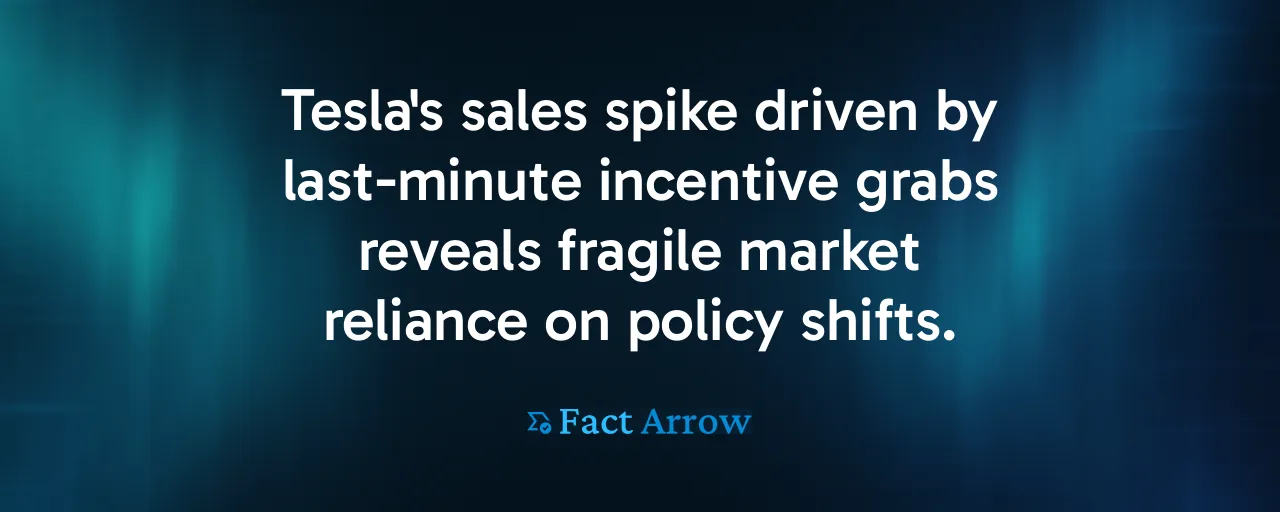A Fleeting Victory in Tesla's Delivery Numbers
Tesla's second-quarter delivery numbers for 2025 hit 384,122 vehicles, a figure bolstered by an unexpected June surge. Analysts at HSBC called the 170,000-180,000 vehicle run-rate in June 'difficult to explain,' suggesting it is an outlier and not a sign of renewed momentum. This spike comes after two quarters of declining sales, raising questions about what's driving consumer behavior and whether Tesla can sustain its market lead.
The numbers tell a complex story. While Tesla's energy-storage deployments remain strong at 9.6 gigawatt-hours, production outpaced deliveries by 26,000 units, hinting at inventory challenges. For advocates of sustainable transportation, the broader issue extends beyond Tesla's sales to whether electric vehicles can become accessible to all, moving beyond reliance on tax credits before policy shifts.
June's uptick likely ties to buyers rushing to secure vehicles ahead of expected changes to federal EV incentives. This behavior underscores a reliance on government support, but it also highlights a deeper problem: Tesla's ability to maintain loyalty among climate-conscious consumers is faltering as competition intensifies and brand perceptions shift.
Brand Loyalty Under Pressure
Surveys reveal a growing disconnect between Tesla and its once-loyal base, particularly among environmentally focused buyers. Negative sentiment toward CEO Elon Musk's political activism has measurably reduced purchase intent, especially in liberal-leaning urban markets like California and parts of Europe. These regions, critical for EV adoption, show Tesla's sales slipping even as the broader EV market grows.
Competing automakers, from China's BYD to legacy brands like Ford, are capitalizing on this shift. They're rolling out affordable, high-volume models that appeal to cost-conscious buyers. Tesla's delayed launch of a promised sub-$30,000 vehicle leaves it vulnerable, especially as price cuts erode margins without delivering sustained volume gains. For those prioritizing equitable access to clean transportation, Tesla's aging lineup and premium pricing signal a missed opportunity.
This erosion goes beyond product offerings. Tesla's brand, once synonymous with innovation, now faces polarization. Consumers who once saw Tesla as a climate champion are turning to brands that align more closely with their values, including those emphasizing transparency, safety, and fair labor practices.
Labor and Safety Demand Attention
Beyond market dynamics, Tesla's workplace practices raise concerns for those invested in ethical production. The company's non-union factories have faced scrutiny over worker rights, with reports of safety violations and high injury rates. Advocates for fair labor argue that EV leadership requires technological innovation alongside a commitment to employees who build these vehicles.
Safety issues with Tesla's Autopilot and Full Self-Driving systems add another layer of urgency. Regulatory bodies are pushing for stricter oversight, citing incidents that highlight the risks of overpromising on autonomous technology. For supporters of responsible innovation, these challenges underscore the need for policies that tie incentives to measurable safety and labor standards.
Tesla's reliance on Chinese battery supply chains further complicates its position. While cost-effective, this dependency raises questions about sustainability and geopolitical risks. Policymakers focused on domestic job creation see an opportunity to incentivize local production, ensuring that the EV boom benefits American workers and communities.
Policy as a Catalyst for Change
Federal and state EV tax credits remain a cornerstone of clean energy adoption, but their future is uncertain under a Congress skeptical of subsidies. Advocates for climate progress argue that these incentives ought to persist and expand, with conditions that prioritize unionized production, domestic manufacturing, and rigorous safety protocols. Such measures would address Tesla's vulnerabilities while accelerating equitable access to EVs.
Historical data shows that price cuts, like those Tesla implemented since 2023, boost sales temporarily but fail to address structural barriers like affordability and infrastructure. A comprehensive approach, combining incentives, workforce protections, and investments in charging networks, could ensure that EVs become a reality for all.
The broader EV market is at a tipping point. With global carbon reduction goals looming, policies that reward innovation alongside accountability offer a path to align industry leaders like Tesla with the public good. This moment calls for bold action to reshape the EV landscape for workers, consumers, and the planet.
Reimagining Tesla's Role
Tesla's June surge may grab headlines, but the real story lies in what comes next. Sustained growth requires addressing brand polarization, launching affordable models, and prioritizing worker welfare. For those committed to a cleaner future, Tesla's challenges highlight the need for an EV industry that serves everyone.
Policymakers have a chance to lead by tying incentives to clear standards: labor rights, safety, and domestic production. These steps would strengthen Tesla's position and ensure that the EV revolution delivers on its promise of widespread, equitable adoption.
The road ahead demands accountability and ambition. By aligning innovation with fairness, Tesla and its competitors can drive a future where clean transportation is a fundamental right, and where the workers building that future are valued as much as the vehicles themselves.
